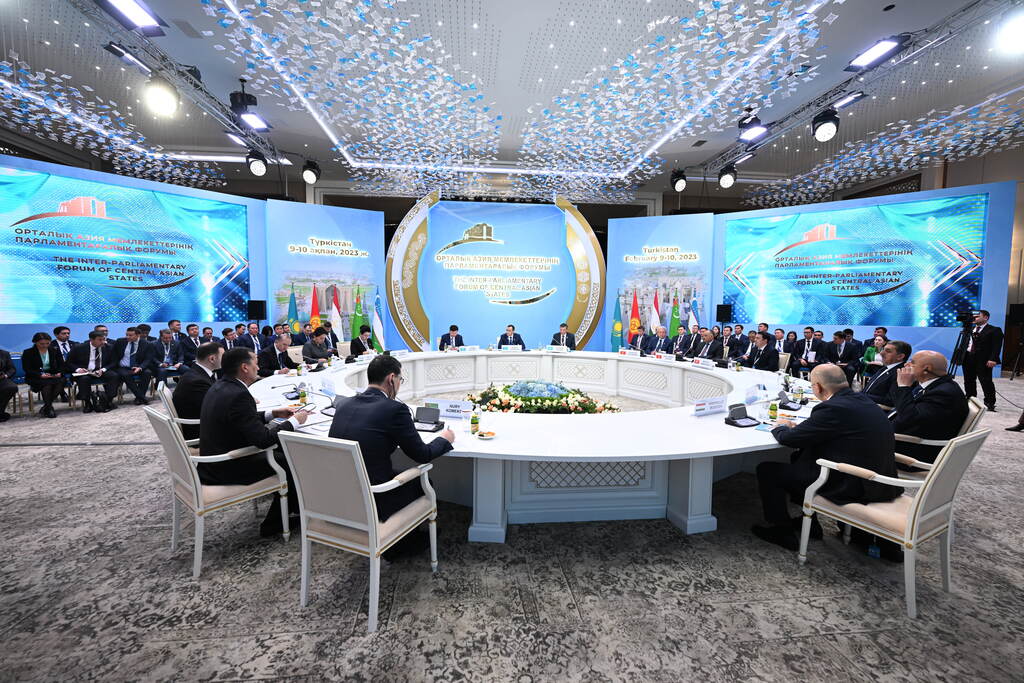ASTANA – The role of parliamentary diplomacy has grown amidst a tense geopolitical situation and global economic instability, said Kazakh President Kassym-Jomart Tokayev in his address to the participants of the Inter-Parliamentary Forum of Central Asian States, delivered by Kazakhstan’s Senate Chairman Maulen Ashimbayev on Feb. 10, as reported by the Kazakh Senate’s press service.

Kazakhstan’s Senate Chairperson Ashimbayev delivered welcoming address of President Tokayev on Feb. 10. Photo credit: Kazakh Senate’s press service.
According to Tokayev, the work of parliamentarians plays a significant role in the legislative support of bilateral agreements, maintaining friendly and neighborly relations, and promoting regional cooperation. He noted the centuries-old close and cordial relations between the Central Asian peoples had reached a new level in recent years.
“The constant deepening of economic cooperation is critical for our countries today. Priority should be given to growing regional and cross-border trade, building collaborations in the transit and transportation sectors, and launching new collaborative projects. It is essential to enrich humanitarian cooperation with new essence to preserve Central Asia’s common spiritual heritage and form a single cultural and historical space,” said Tokayev.
The Inter-Parliamentary Forum of Central Asian States was attended by the heads of parliaments from Kazakhstan, Kyrgyzstan, Uzbekistan, Tajikistan, and Turkmenistan. Turkistan, a city of more than 1,500 years in the south of Kazakhstan, was chosen as a meeting location not by chance, since it holds sacred significance for the Central Asian nations.
Kazakh Senate Chair Ashimbayev opened his remarks with condolences to the fraternal Turkish nation in light of the Feb. 6 deadly earthquake. He thanked his colleagues for their participation and support of the forum’s work, emphasizing that enhancing inter-parliamentary interaction will deepen and expand strategic cooperation among Central Asian states.
“Central Asia’s future depends on close cooperation and confidential dialogue, as well as the creation of coordinated responses to external and internal challenges. These issues are frequently discussed at bilateral and multilateral meetings of our heads of state. On the path of inter-parliamentary collaboration, we must continually support these principles,” said Ashimbayev.
Ashimbayev outlined five major fields of cooperation, among them the forum’s role as a platform for parliamentary dialogue and discussion of the specific areas of inter-parliamentary cooperation, the exchange of experience in legislative support for reforms, and the resolution of urgent regional problems, such as the joint use of transboundary rivers, ensuring environmental and energy sustainability.
Another issue that has been highlighted is the need to strengthen cultural and humanitarian cooperation along with the interaction between Central Asian intellectuals. Ashimbayev also advocated holding the Inter-Parliamentary Forum annually, not just in the capitals of one of Central Asia’s countries but also in other cities with spiritual, cultural, and historical value for the region’s peoples.
The Turkistan Declaration was adopted as a result of the forum. It reflects on the prospects for continued development of inter-parliamentary relations aimed at boosting economic cooperation and building a common cultural and historical space of Central Asia with its own special identity.
